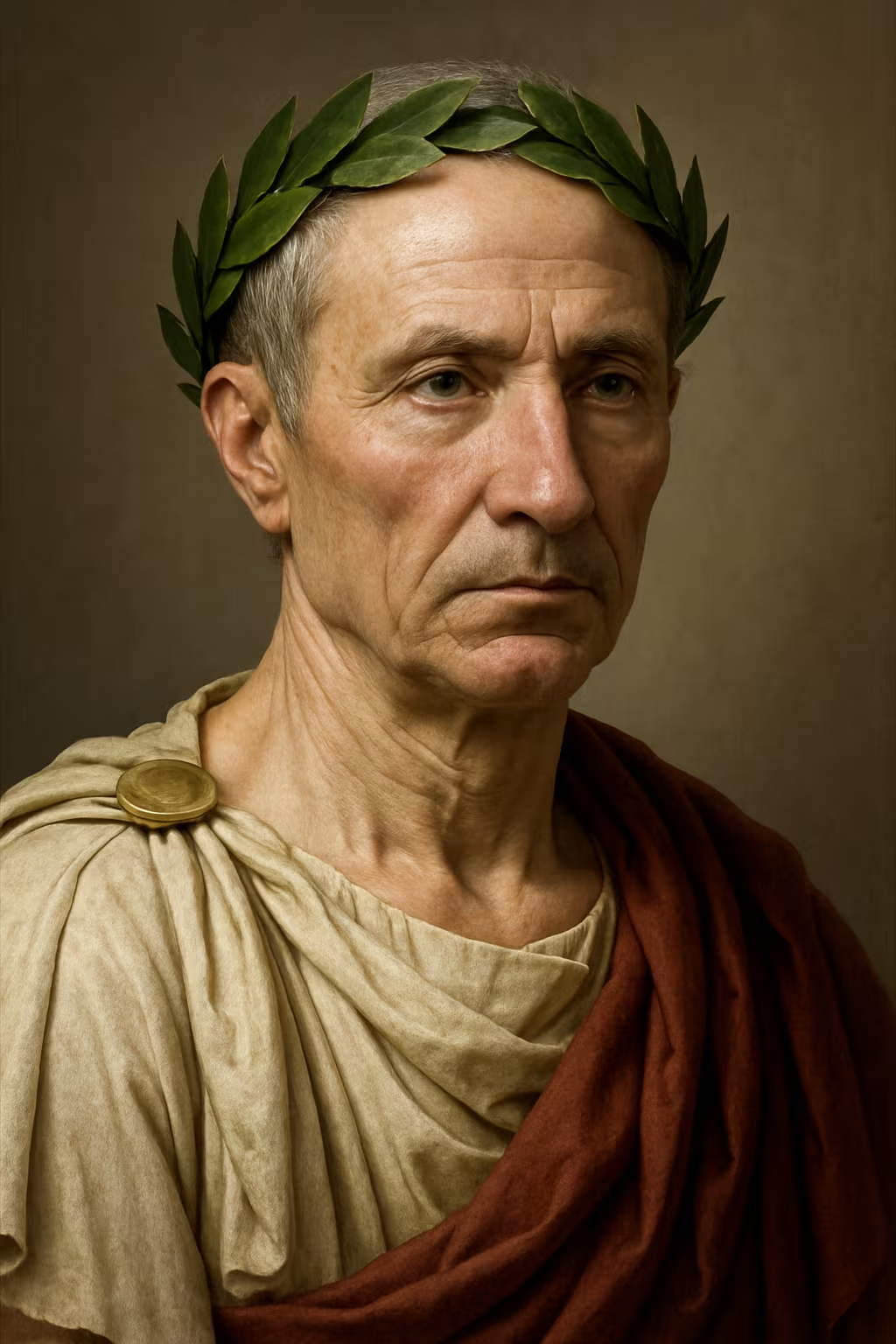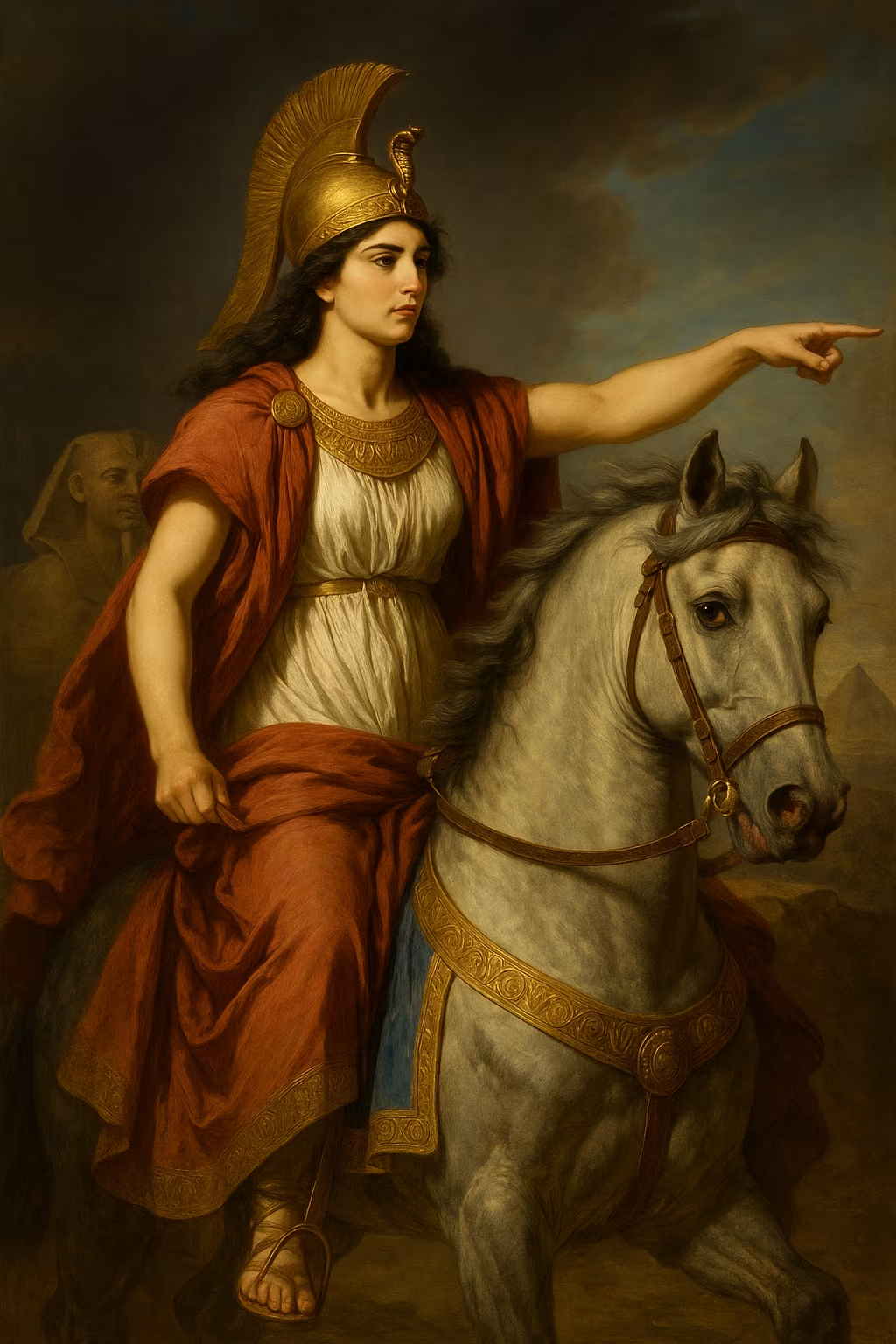Julius Caesar (100 BC – 44 BC)
Quick Summary
Julius Caesar (100 BC – 44 BC) was a general and major figure in history. Born in Rome, Roman Republic, Julius Caesar left a lasting impact through Conquest of Gaul; victory at Alesia (52 BC).

Birth
101 BC Rome, Roman Republic
Death
45 BC Rome (Curia of Pompey), Roman Republic
Nationality
Roman
Occupations
Complete Biography
Family And Early Life
Born in 100 BC in Rome into the patrician Julian clan, which claimed mythical descent from Iulus, son of Aeneas, Caesar grew up amid the late Republic’s violence and factionalism. Through his aunt Julia he was related to Gaius Marius, the popularis war hero and seven-time consul, a connection that placed the young Caesar in the populares orbit and on a collision course with the optimates. During Sulla’s dictatorship (82–79), Caesar narrowly escaped the proscriptions, reportedly refusing to repudiate his wife Cornelia, daughter of Cinna. Stripped of property and priestly prospects and forced into hiding, he survived thanks to allies who interceded. Once the political climate thawed, he served in Asia and Cilicia, earning the corona civica at Mytilene (80), an honor granted for saving a fellow citizen in battle. In 75, en route to Rhodes to study rhetoric with Apollonius Molon, he was kidnapped by Cilician pirates; after his ransom was paid, Caesar pursued, captured, and—after a display of legal punctilio—had them executed, a vignette often cited as emblematic of his resolve. Back in Rome, he built a reputation as an orator and advocate noted for lucid, forceful delivery. Early magistracies and priesthoods followed, laying the groundwork for higher office.
Rise In Roman Politics
Caesar was quaestor in 69 BC (Hispania), where administrative experience and inheritance strengthened his finances; he delivered notable funeral orations for his aunt Julia and for Cornelia. As aedile in 65 he staged lavish games and urban works that boosted his popularity but deepened his debts. He served as praetor in 62 and then as propraetor in Hispania Ulterior (61–60), winning military successes sufficient to request a triumph. Political realities forced a choice between triumph and the consulship; he chose the latter and in 60 forged the informal pact later called the First Triumvirate with Pompey and Crassus. As consul in 59 BC, he pushed through agrarian legislation and secured a proconsular command in Cisalpine and Transalpine Gaul with Illyricum for five years (later extended), obtaining both military scope and political independence from senatorial obstruction.
Gallic Wars 58 50 Bc
Across eight campaigning seasons Caesar dismantled the military power of Gaul. In 58 he repelled the Helvetian migration and defeated Ariovistus, a Germanic king in eastern Gaul. In 57 he subdued the Belgae; in 56 he broke the maritime Veneti with an improvised fleet on the Atlantic coast; in 55 he threw a timber bridge across the Rhine to cow Germanic tribes and launched the first of two cross-Channel expeditions to Britain (55, 54), projecting Roman reach beyond the traditional frontier. Winter quarters in 54/53 were marred by the Eburones’ revolt under Ambiorix, which Caesar brutally punished. In 52 a grand coalition led by Vercingetorix dealt Caesar a setback at Gergovia, but the encirclement works at Alesia—double lines of fortification against sorties and relief armies—forced Vercingetorix’s surrender and broke organized Gallic resistance. Mopping-up operations culminated at Uxellodunum (51). Throughout, Caesar’s Commentarii de Bello Gallico shaped Roman opinion, presenting operations with spare third-person clarity and political purpose.
Civil War And Dictatorship
Amid escalating hostility in Rome, the Senate—prodded by Caesar’s opponents—ordered him to surrender command. On 10/11 January 49 BC he crossed the Rubicon with Legio XIII, making civil war inevitable. He swiftly took Italy, then bested Pompey at Pharsalus (48) despite inferior numbers; Pompey fled to Egypt and was murdered. Caesar intervened in the Alexandrian War, backing Cleopatra VII in the dynastic struggle, and secured victory on the Nile (47). He then crushed Pharnaces at Zela in 47 (dispatching the famous “veni, vidi, vici”), defeated the Pompeian coalition at Thapsus in Africa (46), and destroyed the last resistance at Munda in Spain (45).
Reforms And Governance
Holding the dictatorship repeatedly—and finally as dictator perpetuo in early 44—Caesar launched a dense program: resettlement of veterans, colonial foundations in Italy and overseas, limited debt relief and tighter credit rules, expansion and rebalancing of the Senate to include Italians and provincials, streamlined courts and provincial administration, and adjustments to grain distribution. His most durable measure, designed with the Alexandrian astronomer Sosigenes, was the Julian calendar: decreed in 46 BC with an extended “year of confusion,” it took effect on 1 January 45, aligning the civil year with the solar cycle. He cultivated public support through spectacles and largesse, tolerated some traditional forms while centralizing decision-making, and allowed his portrait on coinage—an innovation that unsettled republican sensibilities.
Cleopatra And The East
Caesar’s Egyptian settlement installed Cleopatra VII (with a co-ruler) and placed the kingdom within Rome’s strategic orbit. Their political alliance had a personal dimension; Cleopatra bore Ptolemy XV Caesarion in 47 BC. In Asia Minor and Syria, Caesar’s settlements stabilized client relations and communications, securing Rome’s eastern approaches while he prepared to return west.
Assassination Ides Of March
Honors piled upon honors—culminating in the title dictator perpetuo—convinced many senators that Caesar aimed at monarchy. A conspiracy led by Brutus, Cassius, and others struck on 15 March 44 BC in the Curia of Pompey. Ancient sources speak of roughly twenty-three wounds. The assassination fractured the elite and ignited a new cycle of civil wars that ended not with a restored Republic but with Octavian’s supremacy and the Principate.
Writings And Style
Caesar’s surviving works are the Commentarii on the Gallic and Civil Wars; companion texts on the Alexandrian, African, and Spanish wars, likely by Aulus Hirtius and other associates, continue the narrative. His prose is famously concise, third-person, and operational—eschewing ornament for clarity and persuasion. The Commentarii double as campaign reports and political apologia, profoundly shaping later views of both Caesar and Rome’s expansion.
Legacy
Conqueror, reformer, and author, Caesar redirected the Roman state. Posthumously deified as Divus Iulius, he gave his name to rulership itself—Caesar, Kaiser, Tsar—and his calendar and administrative patterns endured for centuries. Yet his career also dramatized the limits of republican structures under imperial pressures, making him both model and warning for generations.
Achievements and Legacy
Major Achievements
- Conquest of Gaul; victory at Alesia (52 BC)
- Crossing the Rubicon; victory in the civil war (49–45 BC)
- Julian calendar reform (effective 45 BC)
- Citizenship expansion; veteran colonies; senate enlargement
- Author of the Commentarii (Gallic and Civil Wars)
Historical Legacy
Caesar’s conquests, reforms, and prose shaped the end of the Republic and the birth of the Empire; his very name became a title for rulers.
Detailed Timeline
Major Events
Birth
Rome, 100 BC (day uncertain)
Quaestorship
Service in Hispania
Aedileship
Lavish games and urban works
Praetorship
Judicial and political authority
First Triumvirate
Alliance with Pompey and Crassus
Consulship
Agrarian laws; Gallic command
Gallic Wars begin
Helvetii; Ariovistus
Alesia
Vercingetorix’s surrender
Rubicon
Civil war commences
Pharsalus
Decisive victory over Pompey
Zela
"Veni, vidi, vici"
Thapsus & Calendar
African victory; Julian calendar adopted
Munda
Pompeian resistance crushed
Assassination
Ides of March, Rome
Geographic Timeline
Famous Quotes
"Veni, vidi, vici."
"Alea iacta est."
"Gallia est omnis divisa in partes tres."
External Links
Frequently Asked Questions
When was Julius Caesar born and when did he die?
Born in 100 BC (day debated) in Rome; assassinated on March 15, 44 BC, in Rome.
What did Caesar write?
The Commentaries on the Gallic War and on the Civil War; other campaigns were reported by associates.
What reforms did he enact?
Julian calendar; limited debt relief; veteran colonies; enlargement of the Senate and citizenship; provincial reorganization.
Why was he assassinated?
Opponents feared a de facto monarchy and his concentration of power.
What is the Rubicon?
A small river marking Italy’s northern boundary; crossing it in 49 BC triggered the civil war.
Sources and Bibliography
Primary Sources
- César — Commentarii de Bello Gallico & de Bello Civili
- Suétone — Vie de César (Divus Iulius)
- Plutarque — Vie de César
- Appien — Guerres civiles
Secondary Sources
- Goldsworthy, Adrian — Caesar: Life of a Colossus ISBN: 9780300126891
- Gelzer, Matthias — Caesar: Politician and Statesman ISBN: 9780674091805
- Meier, Christian — Caesar ISBN: 9780006863128
External References
See Also
Related Figures
Specialized Sites
Batailles de France
Discover battles related to this figure
Dynasties Legacy
Coming soonExplore royal and noble lineages
Timeline France
Coming soonVisualize events on the chronological timeline
